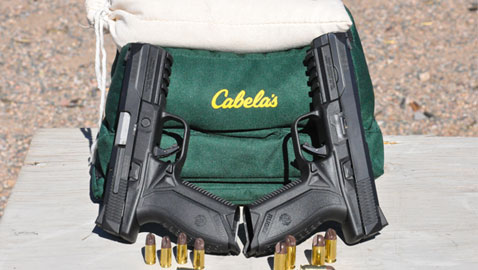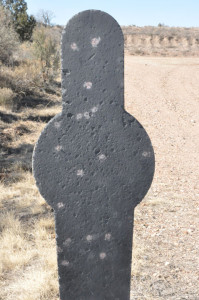 Being shot at was not an unusual experience during my years as a United States Border Patrol Agent. There were times when bullets whizzed past all night long, while during more peaceful periods a week or two might go by without the need to duck. Unlike police officers, who usually experience gunfire at close range, most of the bullets launched at BP agents come from long-range, generally somewhere between 25 and 150 yards. This long-range sniping caused me to develop a keen interest in finding out how far I could make reliable hits on man-sized targets so I worked at extending my pistol skills beyond the 50 yards we fired in our quarterly qualifications. Later, when I became a firearms instructor I routinely set up courses of fire challenging “my” agents to shoot their pistols at 100 and 150 yards.
Being shot at was not an unusual experience during my years as a United States Border Patrol Agent. There were times when bullets whizzed past all night long, while during more peaceful periods a week or two might go by without the need to duck. Unlike police officers, who usually experience gunfire at close range, most of the bullets launched at BP agents come from long-range, generally somewhere between 25 and 150 yards. This long-range sniping caused me to develop a keen interest in finding out how far I could make reliable hits on man-sized targets so I worked at extending my pistol skills beyond the 50 yards we fired in our quarterly qualifications. Later, when I became a firearms instructor I routinely set up courses of fire challenging “my” agents to shoot their pistols at 100 and 150 yards.
High velocity bullets have a flatter trajectory than slower bullets and require less hold over at long range. For example, to get hits at 100 yards with a slow, heavy bullet like that fired from a .45ACP I hold on the top of the head to get torso hits on silhouette targets. With bullets moving out at 1200 feet per second (fps) or more I can generally eliminate holding over and aim center at 100 yards, while using the “top of the head” hold for hits at 150 yards. Back to the Border Patrol, the loads that worked well for me at long range were the Winchester Silvertip 145gr. load in .357 Magnum at about 1250fps and the Federal 124gr. Hydra-Shok +P+ in 9mm at around 1350fps.
So, why am I bringing this up now? Well, Ruger recently teamed with PolyCase Ammunition to produce ammunition using their unique ARX bullet, a lightweight projectile driven at high velocity. My initial testing of the .380 and .45ACP ARX ammo produced good results (DRTV November 2015) and now I have samples of the 9mm round as well. I’ve received a number of questions concerning shooting the ARX ammo at long range so I decided to try the 9mm and .45ACP versions in the new Ruger American Pistols (DRTV December 2015) and see how they work at 100 yards.
 Compared to conventional pistol ammunition this ARX stuff is pretty fast. The Ruger .45ACP ARX ammo uses a 114gr. bullet at a claimed 1350fps. I recorded an average velocity for 10 rounds fired over the chronograph of 1333fps from the 4.5” Ruger American barrel – pretty close. The Ruger ARX 9mm ammunition is listed as a +P load with the 80gr. bullet advertised to achieve a muzzle velocity of 1445fps. Ten rounds through the 4.2” Ruger American barrel gave me an average velocity of 1428fps, again, pretty close to the velocity printed on the ammo box.
Compared to conventional pistol ammunition this ARX stuff is pretty fast. The Ruger .45ACP ARX ammo uses a 114gr. bullet at a claimed 1350fps. I recorded an average velocity for 10 rounds fired over the chronograph of 1333fps from the 4.5” Ruger American barrel – pretty close. The Ruger ARX 9mm ammunition is listed as a +P load with the 80gr. bullet advertised to achieve a muzzle velocity of 1445fps. Ten rounds through the 4.2” Ruger American barrel gave me an average velocity of 1428fps, again, pretty close to the velocity printed on the ammo box.
To see if the pistols, the ammunition and I could work together well enough to get hits at 100 yards I chose a difficult target, a steel Pepper Popper. It’s a difficult target because it’s smaller than a silhouette, being about 40 inches tall with a 12-inch center, and most conventional pistol sights tend to completely cover it at 100 yards. The American pistols have excellent Novak’s three dot sights, but still, at 100 yards, the front sight covers most of a Pepper Popper. There are a couple of ways to hold over with pistol sights for long range shooting. One way is to elevate the front sight in the rear sight notch and the other is to maintain a normal sight picture and hold the sights high on the target. For my initial shots I held on the head, hoping for a center “torso” hit and shot right over the top of the Pepper Popper. Holding center with a normal sight picture I was able to get repeated hits with both pistols, some striking in the center, some a little high and some a little low. Not bad, considering the front sight was covering most of the target and I was not getting a consistent aiming point.
The limiting factors for long range pistol shooting are the size of the target compared to the sights and the velocity of the bullet, with bigger targets and faster bullets making things easier than with smaller targets and slow bullets. My brief experiment confirmed that relatively high velocity is a big help in shooting pistols at longish ranges but didn’t tell me a lot about how accurate or effective this ammo is at 100 yards, except in a general way. It’s accurate enough to hit a Pepper Popper but I don’t know how much velocity or energy these bullets had left or how effective they might be as defensive rounds – except to say I wouldn’t want to get shot with one. My conclusion is the Ruger ARX ammo works well at 100 yards and the excellent sights and triggers on the Ruger American pistols helped me get the hits.
About the Author:
 Ed Head is a regular on Shooting Gallery, Gun Stories and Down Range TV. He has worked for almost 30 years in law enforcement, first in the United States Air Force and then with the United States Border Patrol, retiring as a Field Operations Supervisor. During his Border Patrol career, Ed worked in a variety of patrol, investigative and training capacities. Ed has an extensive background as a firearms instructor, having trained thousands, ranging from beginners to police, military and special operations personnel. Having taught at Gunsite for 20 years, Ed first trained there under the world famous shooting school’s founder, Jeff Cooper, then later ran the school as the operations manager for more than five years. Ed lives in Chino Valley, Arizona, where he continues to teach and write.
Ed Head is a regular on Shooting Gallery, Gun Stories and Down Range TV. He has worked for almost 30 years in law enforcement, first in the United States Air Force and then with the United States Border Patrol, retiring as a Field Operations Supervisor. During his Border Patrol career, Ed worked in a variety of patrol, investigative and training capacities. Ed has an extensive background as a firearms instructor, having trained thousands, ranging from beginners to police, military and special operations personnel. Having taught at Gunsite for 20 years, Ed first trained there under the world famous shooting school’s founder, Jeff Cooper, then later ran the school as the operations manager for more than five years. Ed lives in Chino Valley, Arizona, where he continues to teach and write.

I have some of the ARX ammo, but haven’t fired any yet. In .45ACP, of course!
But I am thinking that the ARX bullet is going to use its rotational velocity to cause damage, more than its forward velocity. So as long as it can penetrate at all, it ought to do about as much damage at long range as close up.
I often try shooting at Poppers and IPSC plates at 100 yards and more. I find I need to aim just about 6 inches over the head to get a center hit. This is with hardball. Interesting that you can aim dead on with the ARX and get a hit.
It remains to be seen how effective the ARX ammo will be as a defensive round; I’m not aware of any shooting reports at close or long range. Unable to chronograph the loads at 100 yards I don’t know how much velocity these bullets shed. The rotational speed would still be high at 100 yards but I suspect the rotation accounts for less tissue damage than the shock wave generated off the front of the bullet and that is dependent upon velocity.
Ed